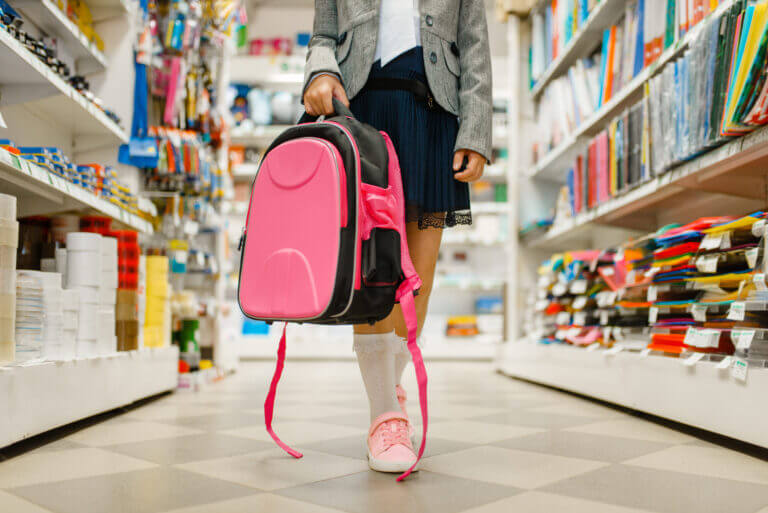Back-to-school prep involves so much more than stocking up on pencils and the usual supplies. So, we chatted with experts at K12-powered online schools and compiled the ultimate back-to-school guide to help both kids and parents kick off the school year with a bang. Whether your child attends school in-person or online, we’ve thought of everything from delicious brain-boosting snacks and focus-friendly playlists to cool organizational tools and fun rewards. Don’t forget to bookmark this list—the school year will be here before you know it!
Parent and Learning Coach Prep
Parents, it’s time to get ready for the school year! Here are some of our favorite ways to stay ahead of the curve, whether your child is going to a traditional classroom or logging in to online school from home:
Try some brain-boosting snack recipes.
Food is fuel and research shows there are specific nutrients and foods that support brain development and boost cognitive function. Some of the top brain-boosting foods include eggs, berries, salmon, oats, yogurt, and green, leafy veggies. These are often key ingredients of recipes that can be used for yummy homemade snacks, perfect for packing in their school lunchbox or serving at home. Best of all, many of these recipes are easy for us parents to make!
Find more delicious, kid-friendly recipes at Healthy Little Foodies or Taste of Home.
Take a school tour.
Is this your child’s first year at a new school? Setting up a tour provides meaningful insight into their daily life and will help you set the scene for your child, whether they’re attending traditional or online school. Be sure to come with your questions, such as:
- What does a day-in-the-life look like for a student here?
- What’s the dress code?
- What time is their lunch break?
- What is the school culture like?
- How many students attend the school and on average, how large are the classes?
- How do you incorporate STEAM (science, technology, engineering, art, and math) into learning?
- What’s the school’s approach to disciplinary concerns and safety?
- What kind of library resources are available?
- Does this school offer a gifted and advanced learning program?
- Do you offer career or college prep programs and opportunities?
- How often will I hear from teachers about my student’s progress?
Set up school phone apps.
These days, most schools and teachers communicate with parents using apps like Remind, Class Dojo, and more, while others rely on email or text messaging. Check the school’s welcome packet to find out which communication method your child’s school uses or contact the school if it’s unclear. Setting everything up before the first day of school will make sure you’re in the loop for all important announcements.
Create a list of bonding activities.
Between work, school, and everything in between, it’s easy to get caught up in the routine, whether you’re busy making dinner, checking their homework, or making sure they have clean clothes for the week. While these are all essential tasks, it’s also important to fit in activities that deepen your bond with your child, whatever grade they’re starting this year. Take a deep breath, pause the chaotic schedule, and enjoy some bonding time with your kid through one of these fun activities:
- Gardening: Start a small garden by planting your favorite herbs or veggies or some beautiful flowers.
- Cooking together: My family loves making personalized pizzas!
- Listening to an audiobook: Check out all the reasons listening to audiobooks can benefit your kiddo in this Learning Liftoff article!
- Movie night: Don’t forget the popcorn and fuzzy blankets.
Additional Tips for Parents of Online Students
Being the parent of an online student comes with unique challenges and situations. Here are some additional tips that are particularly useful for learning coaches helping their kids succeed in online education:
Create a daily schedule.
The flexibility of online school lets you decide how to structure the school day. Stay organized and on task by creating a daily schedule, factoring in breaks, outdoor time, and exercise. This will also help your child determine what extracurricular activities they want to incorporate into their schedule.
“As students build out a new routine with their class schedule, have them evaluate the time they have to become involved with a club, volunteering, or even start working,” Laura Massey, Student Career Coaching Manager at K12 shares. “These activities help students explore their interests, further develop durable employability skills, and provide insight into their life after high school goals.”
Write out your outdoor activity list.
Create a list of outdoor activities to incorporate throughout the day, and don’t be afraid to try something new! Walking, gardening, or playing a sport like baseball or soccer are all great ways to get some fresh air and exercise throughout the school day.
Meet other parents.
Find out how you can connect with other online school families. K12 offers the Learning Coach Community where you can share tips and resources with other parents of online students.
Setting Up a Study Space
It’s important to have a designated workspace, free from distractions, where your child can concentrate on their studies. Here are a few ideas for creating the perfect, personalized nook where deep learning can take place:
- Desk and comfortable chair
- Pillows and a blanket for cozy reading time
- Décor, such as framed photos, wall art, or decorative desk supplies
- Trash can and recycle bin
- Traveling lap desk for students who work on a laptop and want the freedom to move around throughout the day
Exploring Motivational Tools
We all face obstacles and challenging days when we need a little extra encouragement or motivation. Depending on your child’s needs, these are some ways to help keep them working toward their goals:
Find a study-friendly playlist.
K12-powered online schools offer a variety of playlists to choose from, including instrumental music and soothing sounds. Music can help narrow your focus and drown out distracting noises.
Make a reward jar.
Did your kid ace a test or complete a challenging section of homework? A reward jar can serve as motivation to work toward these goals, no matter your kid’s age. Write age-appropriate rewards on scraps of paper and toss them in the jar. When your child achieves a goal, let them choose a reward from the jar.
Hang a sticker chart.
Perfect for elementary online students, create a sticker chart to track and reward good behavior, attention, and class participation.
Read tips for managing stress.
Even little ones can get overwhelmed by their daily schoolwork. Learn to recognize the signs and symptoms of stress and discover ways to help them work through it.
Encourage them to move.
Grab your outdoor activity list and get outside! Sometimes, getting the wiggles out and moving our bodies can help reenergize our minds.
Getting Organized
Organization is key to staying on track to a successful school year. Even if organizational skills don’t come naturally to you, there are some simple tools you can use remain focused and keep your school supplies organized and tidy:
- Calendar for keeping track of important dates
- Analog clock for staying on schedule
- White board or chalk board for taking notes
- Supply caddy for writing and art supplies
- Folders with tabs
- Visual checklists
Supply List for All Ages
This list will help prepare students at any grade level to take on the new school year:
- Pencils
- Pens
- Pencil box
- Sharpener
- Whiteout
- Tape
- Glue sticks
- Ruler
- Sticky notes
- Index cards
- Notepads
- Folders
- Binder
- Sketchpad
- Book covers
- Hole punch
- Travel desk
- Calculator
- Ink cartridges
- Lunch box
- Water bottle
- Storage boxes
- Trashcan / recycling bin
- Art portfolio
Check your school’s back-to-school list to see what other tools your child will need since this will depend on their school and grade level. Elementary school students may need additional supplies like markers, crayons, and watercolors, while middle and high school students may need a calculator and college-ruled notebooks.
Additional Supplies for Supplemental Learning
If your child is attending online school, you may want to purchase additional supplies for arts and crafts, cooking and baking, and science experiments. These supplies can help you get started on some simple at-home projects:
- Measuring cups
- Apron
- Drop cloth
- Poster board
- Hot glue gun or glue
- Paint and paint brushes
To learn more about K12-powered online schools, go to K12.com.























































































































